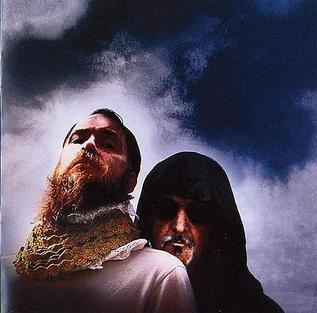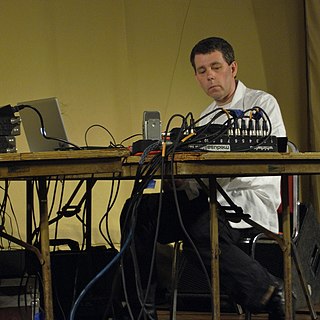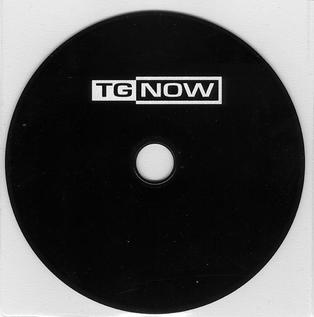Industrial music is a genre of music that draws on harsh, mechanical, transgressive or provocative sounds and themes. AllMusic defines industrial music as the "most abrasive and aggressive fusion of rock and electronic music" that was "initially a blend of avant-garde electronics experiments and punk provocation". The term was coined in the mid-1970s with the founding of Industrial Records by members of Throbbing Gristle and Monte Cazazza. While the genre name originated with Throbbing Gristle's emergence in the United Kingdom, artists and labels vital to the genre also emerged in the United States and other countries.
Industrial Records is a record label established in 1976 by industrial music and visual arts group Throbbing Gristle. The group created the label primarily for self-releases but also signed several other groups and artists. The label gave a name to the industrial music genre.

Throbbing Gristle were an English music and visual arts group formed in Kingston upon Hull by Genesis P-Orridge and Cosey Fanni Tutti, later joined by Peter "Sleazy" Christopherson and Chris Carter. They are widely regarded as pioneers of industrial music. Evolving from the experimental performance art group COUM Transmissions, Throbbing Gristle made their public debut in October 1976 in the COUM exhibition Prostitution, and released their debut single "United/Zyklon B Zombie" and debut album The Second Annual Report the following year. P-Orridge's lyrics mainly revolved around mysticism, extremist political ideologies, sexuality, dark or underground aspects of society, and idiosyncratic manipulation of language inspired by the techniques of William S. Burroughs.

Coil were an English experimental music group formed in 1982 in London and dissolved in 2005. Initially envisioned as a solo project by musician John Balance, Coil evolved into a full-time project with the addition of his partner and Psychic TV bandmate Peter Christopherson, formerly of pioneering industrial music group Throbbing Gristle. Coil's work explored themes related to the occult, sexuality, alchemy, and drugs while influencing genres such as gothic rock, neofolk and dark ambient. AllMusic called the group "one of the most beloved, mythologized groups to emerge from the British post-industrial scene."

Peter Martin Christopherson was an English musician, video director, commercial artist, designer and photographer, and former member of British design agency Hipgnosis.

Psychic TV were an English experimental video art and music group, formed by performance artist Genesis P-Orridge and Scottish musician Alex Fergusson in 1981 after the break-up of Throbbing Gristle.
Dark ambient is a genre of post-industrial music that features an ominous, dark droning and often gloomy, monumental or catacombal atmosphere, partially with discordant overtones. It shows similarities with ambient music, a genre that has been cited as a main influence by many dark ambient artists, both conceptually and compositionally. Although mostly electronically generated, dark ambient also includes the sampling of hand-played instruments and semi-acoustic recording procedures.
Paula P-Orridge, also known as Alaura O'Dell, is an English musician, writer, and entrepreneur.

Chris Carter is an English musician, best known for being a member of Throbbing Gristle and the duo Chris & Cosey, both with his longtime partner Cosey Fanni Tutti.

Chris & Cosey, sometimes known as Carter Tutti, are a musical duo formed in 1981, consisting of couple Chris Carter (electronics) and Cosey Fanni Tutti, both previously members of industrial music pioneers Throbbing Gristle. Since the release of their 1981 debut album Heartbeat, the group have expanded on the rhythmic ideas of Throbbing Gristle while adding synthesized pop elements to their sound.

20 Jazz Funk Greats is the third studio album by British industrial music group Throbbing Gristle, released in December 1979 by the band's Industrial Records label. Known for its tongue-in-cheek title and artwork, it has been hailed as the band's best work, with Fact naming it the best album of the 1970s and Pitchfork naming it the best industrial album of all time.

Heathen Earth is a live album by the English industrial band Throbbing Gristle, released in 1980 through Industrial Records.

TG Now is an album by English industrial band Throbbing Gristle. It was released in 2004 through the band's own record label Industrial Records and was their first album of original material since 1982's Journey Through a Body.

The Second Annual Report is the debut album by English industrial music group Throbbing Gristle, released in November 1977 through Industrial Records. It is a combination of live and studio recordings made from October 1976 to September 1977. The Second Annual Report is considered to be influential within electronic music, being one of the first industrial music albums.

D.o.A: The Third and Final Report of Throbbing Gristle is the second studio album by English industrial band Throbbing Gristle, released in December 1978 by their Industrial Records label.

The First Annual Report is a bootleg album of music recorded by industrial music pioneers Throbbing Gristle in 1975. The recording originally went unreleased, and the band instead decided to release The Second Annual Report in 1977. This recording was first released unofficially in 1987 as Very Friendly through Spurt Records, before being issued prominently as The First Annual Report in 2001.
Thee Majesty was a British industrial music group.

Dimensia in Excelsis is an album by the British industrial group Throbbing Gristle. The music was recorded live at the Veterans Auditorium in Los Angeles on 22 May 1981. The album was released in November 1998 under the German label Tesco Organisation in LP record and compact disc format. The album is actually considered to be a bootleg recording; see Throbbing Gristle bootleg discography.
Nekrophile Rekords was an Austrian record label, founded by Zoe Dewitt, then known as Michael Dewitt, that was active during the 1980s.
Stabmental was a British DIY music and cultural fanzine published in the late 1970s and early 1980s covering industrial and postpunk music and the cassette scene. The moving force, main editor and writer of the publication was Geoffrey Rushton, who would later assume the name John Balance and become known as singer and lyricist of the influential postindustrial band Coil. Balance was still at school during most of the period of the magazine’s publication, though he would continue to publish the magazine for a short period after leaving and before his career in music began to take off. The other founding editor was a school friend of Balance’s, Tom Craig. The magazine included interviews with, articles on and reviews of releases and performances by many leading alternative bands and solo artists of the time, such as Throbbing Gristle, Cabaret Voltaire, Clock DVA, SPK, Virgin Prunes, Alternative TV, Eyeless in Gaza, Monte Cazazza, and participants in the so-called ‘cassette culture’, such as The Door and the Window, The Good Missionaries, and Cultural Amnesia. The magazine also featured drawings and collages by Balance, sometimes employing the pseudonym Murderwerkers.













